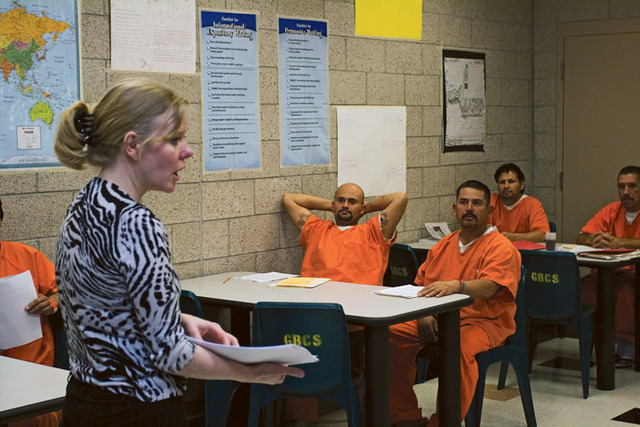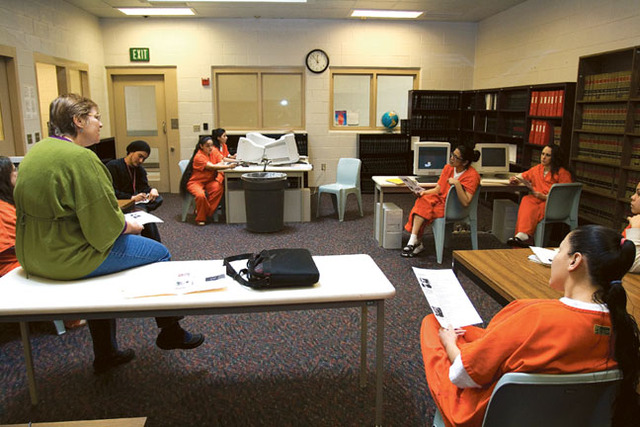For Christmas, the inmates made Kimberlee Hanson a stocking. Construction paper took on the general shape. Maxi pad cotton provided a snow effect. Toothpaste glued it together. Hanson’s students melted down Jolly Ranchers from the commissary and turned them into flowers to include with the gift.Residents of the Bernalillo County Metropolitan Detention Center made the gifts for their teachers at the Gordon Bernell Charter School, which opened about six months ago. That’s how it works in there: Everything is repurposed. Some items become birthday presents, makeup or hairspray.No one’s broken down the literary magazine, Hanson says. The plastic spiral binding, the 168 pages, the laminated cover. "They carry it around," she says. "You see all these big tough guys carrying their book around from class to class. They have not dismantled this. They took care of the book." Writing From Within VIII: The Resourcefulness and Resiliency Issue includes descriptions of a snack “spread" (ramen, pickles, beef stick, picante seasoning and anything else inmates can find) marinated in a clean trash bag under a mattress; how to make Tic Tacs out of toothpaste; and a MacGyvered Halloween costume (by applying homemade face paint, the writers became Cheetos—they’re all wearing orange anyway).Aurora Riley asked MDC to put her copy of the literary magazine with the belongings she’ll get back when she’s released. Her issue was passed from hand to hand. "I’ve got nothing like it on the outside,” she says. All of the women in her pod kept asking her for it, she says. “I didn’t want to them to bend it up and smudge it."Riley is 21 years old, and she’s been inside for seven months, she says. In that time, she’s been allowed to use the computers in the law library four times to type lyrics, poems and essays. When we speak, she’s typing up her wedding vows, because she plans to get married shortly after she leaves MDC. She gives up part of her alloted hour to talk to the Alibi about the literary magazine. Before being published, she says, “I just felt like I was in oranges. I didn’t have my own identity." Her lit-mag essay, dated Nov. 4, 2008, touches on what the presidential election meant to her as a young African-American woman.Riley journals every day, and it helps her even out her mood. When she skips days or weeks, she feels aggravated, she says. She pens comedy pieces about the corrections officers and songs to sing with her nieces and nephews.Inmates work toward earning high school credit through the Gordon Bernell Charter School, which is part of Albuquerque Public Schools. Once released, students can continue their education at the Downtown Albuquerque branch. The literary magazine is the brainchild of Cynthia Wooley, a CNM teacher who’s been working at the jail for more than 20 years. "You just get this other view of society and how down-and-out is really true for a lot of people in Albuquerque," she says. The lit mag is “much better than anything I can say to a committee who’s about to give scholarship money, perhaps. When they read their words, they really jump off the page."She doesn’t edit the magazine with a heavy hand. She leaves in the dark pieces, she says, because she wants to show how people are really doing. She draws the line with profanity, though, and asks that contributers use alternative vocabulary. Learning how to go through multiple drafts of a written work helps inmates learn how to see things through, the instructors add. Plus, the payoff, they say, is huge. "It’s so important for people who are this marginalized to see themselves in print," Wooley says. "It flabbergasts them."Before Wooley began teaching in the jail, she didn’t know about this part of society, she says. "I thought, OK. There are people that are criminals. Then there’s us. I didn’t see all the overlap—of how a woman can not have enough money for her kids and she finds herself at the bank pretending she has a gun in her pocket. This is one of my students."Catrina Devitt’s first poems were published in Writing From Within . She’s been in MDC for 15 months, she says. Since becoming a student at Gordon Bernell, she’s discovered a love of language. She wants a career in writing, and her goal is to someday publish a novel. "I don’t write too much about being here," she says. "I try to move forward." With a clear head, she says she’s been able to let her imagination thrive. Instructor Hanson says her brother and sister have spent time at MDC, and she understands that the line is very thin. "Any one of us could have a moment where a life circumstance would go that way," she says. Both Wooley and Hanson talk about how easy it is for prisoners to enter a cycle, to keep returning to jail. "There’s a high rate of recidivism," Wooley says. "You have to take this extremely long view and not feel weird when you see them again. Because they’re getting out, and you’re like, I know she’s going to make it. A year or so later, there she is again."Hanson says she worries about setting students up with false expectations. "I worry that when the bus drops them off Downtown at 2 a.m. when they’re released, is it enough for them to hold onto, to try to find that minimum wage job, to try and turn their lives around?"Typically as an English teacher, Hanson says, you start with grammar, organization and spelling instruction. Then, you try to help students find their voice. "These students can’t do the spelling as well. They don’t know anything about grammar, but they have incredible voices, and the language really flows," she says. "They have this old soul approach to writing. I can’t read it, but once I can decipher it, it’s so strong because of the voice."That natural storytelling ability comes from their experiences, Hanson says. "They have a lot of instinct about people. They read people all of the time. They’re always checking out their surroundings. They’re very observant in some ways that other people are not."Monica Gonzales is not so into writing, she says, but the lit mag and the classes give her something to think about. Without the mental stimulation and her religious faith—they call her the Church Lady in her pod—she’s sure she’d be falling apart. Her contribution to the magazine is an exercise plan inmates can use to avoid gaining weight due to the starchy foods served in jail. When we speak, she’s working on another dietary article about the grub.Gonzales is proud of her writing but worries that when she did a reading of her work on Channel 27, Albuquerque’s public access station, she embarrassed her son. "It’s hard to be in here when you have kids," she says, and her eyes tear up. Like the other women in the class, she tries to keep her mind off being in jail. "It’s nice that somebody thinks of us a different way than just criminals."
Pick up your copy of Writing From Within at the CNM Foundation A-130 on the Main Campus or the Downtown branch of the Gordon Bernell Charter School at 401 Roma NW on the third floor. Donations are accepted and will go toward funding future projects.











